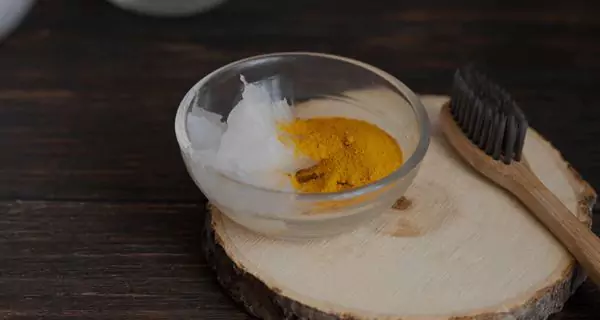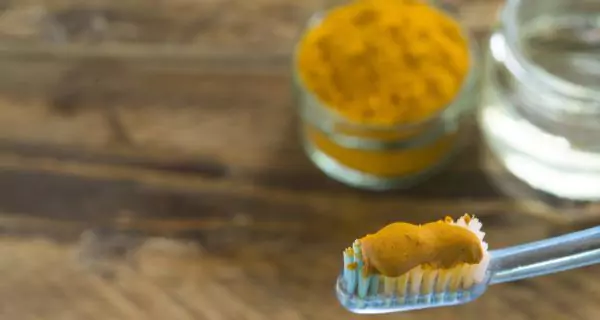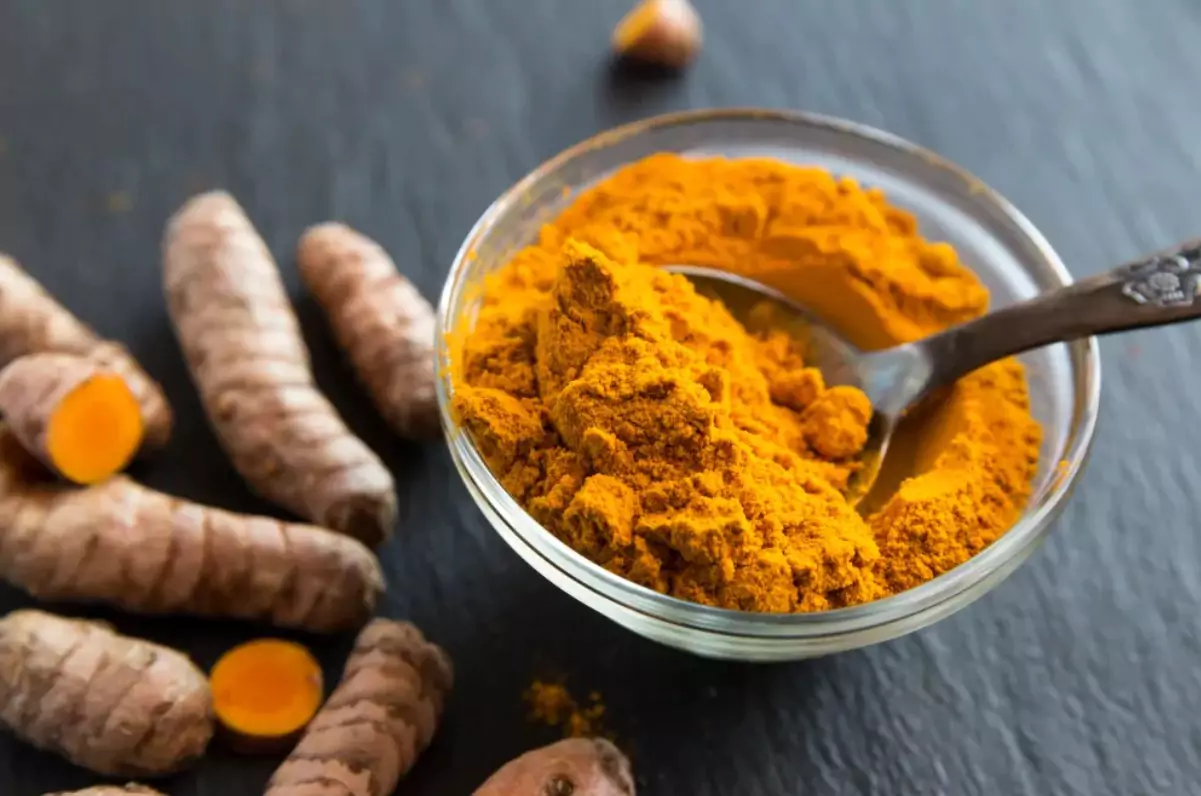Last Updated on: 19th September 2025, 12:30 pm
Can Turmeric and Coconut Oil Toothpaste Whiten Teeth?
While turmeric and coconut oil toothpaste may help reduce plaque and gum inflammation, it doesn't significantly whiten teeth. It's best used as a complementary oral care option rather than a primary whitening solution.
In recent years, more and more people have started questioning the amount of chemicals in everyday products, especially when it comes to personal care. This has led many to explore natural, traditional alternatives that have stood the test of time.
One combination that has gained attention in natural oral care is turmeric and coconut oil toothpaste. Both ingredients are known for their health benefits on their own, but what happens when we combine them?
In this article, we’ll explore why this natural duo has become a popular alternative for dental hygiene, how to use it safely, and what to consider if you decide to make your own turmeric and coconut oil toothpaste.
What Is Turmeric and Coconut Oil Toothpaste?

Before diving into how to use or make it, let’s first understand what turmeric and coconut oil bring to oral care and why their combination has sparked so much interest.
What turmeric offers for oral health
Turmeric is a spice long used in traditional medicine, mainly due to curcumin, its active compound. In dental care, turmeric provides:
- Anti-inflammatory effects: helps soothe swollen, irritated, or bleeding gums.
- Antioxidant action: protects mouth tissues from oxidative damage.
- Antibacterial properties: fights bacteria that cause gum disease.
- Teeth whitening? While many claim turmeric whitens teeth, current studies show that it’s not effective as a whitening agent.
What coconut oil offers for oral health
Coconut oil is a staple in the practice of “oil pulling” rinsing the mouth with oil). In dental care, it provides:
- Antimicrobial effects: Thanks to lauric acid, it combats bacteria like Streptococcus mutans and fungi like Candida albicans.
- Anti-inflammatory and analgesic properties: Helps calm and soothe irritated gums.
- Prevents infections: Reduces bacterial buildup and maintains oral cleanliness.
- Moisturizing and healing: Supports gum hydration and tissue repair.
- Fresher breath: Minimizes bacteria that cause bad odors.
Why combine them?
On their own, both ingredients are packed with benefits. But when combined, they work even better together:
- Turmeric provides powerful anti-inflammatory and antibacterial protection.
- Coconut oil deeply cleanses, hydrates, and soothes.
Together, they create a natural, chemical-free way to clean teeth, calm sensitive gums, and promote overall oral health, making turmeric and coconut oil toothpaste a smart choice for people seeking a holistic dental routine.
What is turmeric and coconut oil toothpaste?

This natural toothpaste is usually a homemade or store-bought blend of turmeric and coconut oil. Some versions include baking soda or peppermint essential oil for added freshness or whitening.
Unlike many commercial toothpastes, this mix contains no fluoride, sulfates, artificial colors, or preservatives. It’s a simple yet powerful formula rooted in centuries of traditional use.
How is it different from regular toothpaste?
The biggest difference is the ingredients. While commercial toothpaste often includes chemicals like fluoride or sodium lauryl sulfate, this natural alternative uses only gentle, plant-based components.
It doesn’t foam, it has a strong yellow color, and the taste can take some getting used to. Still, many people with sensitive gums or looking to reduce chemical exposure find it gentle and effective.
How to use turmeric and coconut oil toothpaste?

Whether you make it at home or buy it, using it correctly is key to getting the most out of its benefits.
Brushing technique
- Use a soft-bristled toothbrush.
- Apply a small amount of the paste.
- Brush gently for about 2 minutes, focusing on the gum line and between teeth.
- Rinse your mouth thoroughly afterward.
How often to use it?
- Start with once or twice a week.
- If your mouth reacts well, you can increase usage.
- Always continue using fluoride toothpaste or follow your dentist’s recommendations to protect your teeth against cavities.
Precautions
- Turmeric can stain your toothbrush, sink, or even your clothes, should clean up everything quickly.
- If you’re allergic to coconut or spices, check with your dentist first.
- Always talk to a dental professional before switching to fully natural products.
Used properly, this toothpaste can be a gentle and effective part of your oral care routine.
DIY turmeric and coconut oil toothpaste recipe
Want to try making your own? It’s easy and affordable.
You’ll need:
- 2 tablespoons coconut oil
- 1 teaspoon turmeric powder
- 1 teaspoon baking soda (optional, for whitening)
- 3–5 drops of peppermint essential oil (optional, for flavor)
Instructions:
- Slightly melt the coconut oil if it is solid.
- Mix all ingredients in a clean bowl until smooth.
- Store in a sealed glass jar.
- Use a clean spoon or spatula to scoop it; don’t dip your toothbrush in the jar.
How to choose a high-quality natural toothpaste?

If DIY isn’t your style, there are natural toothpaste options available. Look for:
- no sulfates, or artificial colors
- organic turmeric and cold-pressed coconut oil
- clean ingredient labels and certifications (vegan, cruelty-free, etc.)
A Popular option is Himalaya Botanique Whitening Antiplaque Toothpaste made with turmeric and coconut oil.
Other natural options that include some of these ingredients are:
These products blend the natural benefits of turmeric and coconut oil, offering an alternative to conventional toothpastes.
Is turmeric and coconut oil toothpaste safe for kids?
Many parents look for natural options for their children’s dental care. Turmeric and coconut oil can be gentle on sensitive mouths, but there are a few things to consider.
Potential benefits
- Natural ingredients: Both turmeric and coconut oil are natural substances known for their anti-inflammatory and antibacterial properties. They may help reduce mild gum irritation and combating harmful bacteria in the mouth.
- Gentle on gums: Coconut oil can soothe irritated gums, and turmeric’s anti-inflammatory properties may assist in maintaining oral health.
Considerations and precautions
- Lack of fluoride: Most turmeric and coconut oil toothpastes are fluoride-free. Fluoride is crucial in strengthening enamel and preventing cavities, especially in developing teeth. The American Dental Association emphasizes the importance of fluoride in children’s toothpaste to prevent tooth decay.
- Risk of ingestion: Young children, particularly those under six, may swallow toothpaste. While natural, excessive ingestion of coconut oil can lead to digestive discomfort, and turmeric might cause stomach upset in large amounts.
- Lack of professional endorsement: Turmeric has not been approved for use in pediatric dentistry, and many pediatric dentists may not recommend its use due to limited research on its efficacy and safety for children.
Recommendations for Parents
- Consult a pediatric dentist: Before introducing any new toothpaste, especially homemade or natural alternatives, consult with your child’s dentist to ensure it’s appropriate for their specific needs.
- Use age-appropriate products: For children under six, use a pea-sized amount of toothpaste and supervise brushing to minimize swallowing.
- Combine with fluoride toothpaste: If opting for natural toothpaste, consider alternating with a fluoride-containing toothpaste or using fluoride treatments as advised by a dental professional.
- Monitor for allergic reactions: Be vigilant for any signs of allergic reactions or sensitivities, especially if your child has known allergies to coconut or turmeric.
When to talk to your dentist?

Just because something is natural doesn’t mean it’s risk-free. Always let your dentist know about new products in your routine.
- Let them know if you’re switching toothpaste, especially if you’ve had cavities, gum issues, or sensitivity.
- A dentist can give personalized advice and help you find a balance between natural care and proven protection.
- Don’t skip your regular checkups and cleanings, natural care works best when combined with professional guidance.
Turmeric and coconut oil toothpaste is a great option if you’re looking for a more natural and gentle approach to oral care. It can help reduce inflammation, fight bacteria, and support gum health, and it’s easy to make at home.
Just remember: it doesn’t contain fluoride and isn’t a replacement for brushing, flossing, or seeing your dentist. If you want to try it, go ahead, just use it mindfully and talk to your dentist to make sure it’s right for you.
Frequently Asked Questions
Does Turmeric actually whiten teeth?
Can I use only this instead of regular toothpaste?
Can I refrigerate homemade turmeric toothpaste?
Does turmeric toothpaste expire?
How does it compare to charcoal toothpaste?
Voice and Search (Q&A)
What are the benefits of using turmeric and coconut oil toothpaste?
Turmeric and coconut oil toothpaste helps reduce gum inflammation, fights harmful bacteria, soothes the mouth, and offers a natural alternative to chemical-based toothpaste.
Is turmeric and coconut oil toothpaste safe for kids?
It can be gentle, but most versions lack fluoride, which is important for preventing cavities in children. Always ask your pediatric dentist before using it for kids.
Can turmeric and coconut oil toothpaste replace regular toothpaste?
No. While it supports gum health and oral hygiene, it doesn’t contain fluoride and shouldn’t replace regular toothpaste unless your dentist advises it.
Share
References
1. Gál, K. (2024, August 27). Benefits, how to, and risks of oil pulling with coconut oil. https://www.medicalnewstoday.com/articles/323757
2. Kumar, R., Mirza, M. A., Naseef, P. P., Kuruniyan, M. S., Zakir, F., & Aggarwal, G. (2022). Exploring the Potential of Natural Product-Based Nanomedicine for Maintaining Oral Health. Molecules, 27(5), 1725. https://doi.org/10.3390/molecules27051725
3. Paul, A. M. (2023). Formulation of an Herbal Toothpaste. Department of Botany, St. Teresa’s College. http://117.239.78.102:8080/jspui/bitstream/123456789/2525/1/Ann%20Mariya%20Paul%20-%20Herbal%20toothpaste.pdf
4. WebMD Contributors. (2024, October 16). What to know about turmeric in dental care. WebMD. https://www.webmd.com/oral-health/what-to-know-turmeric-dental-care
5. White, A. (2019, March 8). Can you use turmeric for teeth whitening? Healthline. https://www.healthline.com/health/turmeric-teeth-whitening
- Dr. Yeidy Carolina Mesa [Author]
DDS Yeidy Carolina Mesa Passionate Dentist | Advocate for Accessible Oral Health Education Graduating from Universidad CES in 2022, I am a dedicated general dentist with a lifelong passion for helping others and making a meaningful impact in the world. My journey into dentistry began at the age of 7, inspired by my own experience with braces and overcoming a fear of the dentist. This personal journey shaped my mission to help patients conquer their own dental anxieties and embrace a healthier,...
View all posts
- Nayibe Cubillos M. [Medical Reviewer]
Pharmaceutical Chemestry |Pharmaceutical Process Management | Pharmaceutical Care | Pharmaceutical Services Audit | Pharmaceutical Services Process Consulting | Content Project Manager | SEO Knowledge | Content Writer | Leadership | Scrum Master
View all posts
A healthcare writer with a solid background in pharmaceutical chemistry and a thorough understanding of Colombian regulatory processes and comprehensive sector management, she has significant experience coordinating and leading multidisciplina...Recent Posts
















